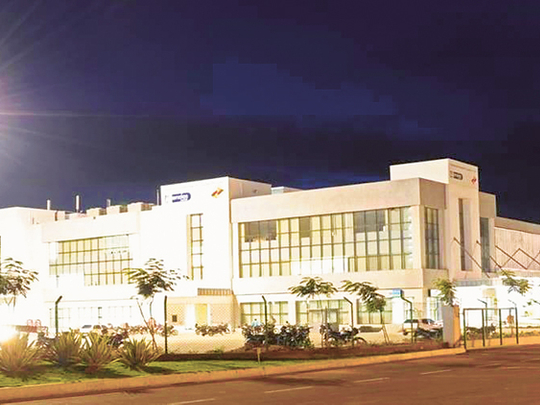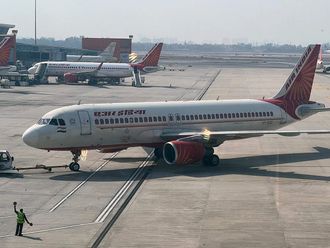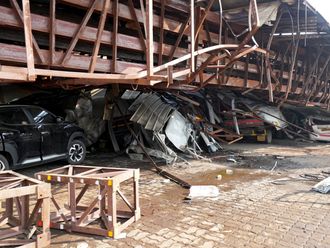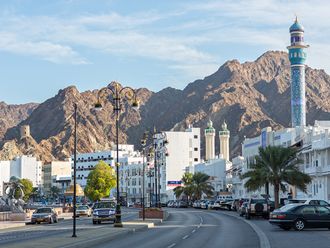
You have probably heard a plethora of tales about Hyderabad's exquisite cuisine — including its world-renowned biryani and its naan bread rolls — its ancestral heritage, represented by a cluster of beautiful, ancient palaces and monuments, and, of course, the city's more contemporary exploits in the field of information technology, assuming the heady moniker of Cyberabad.
However, not many people know that Andhra Pradesh's capital city has become India's, and possibly Asia's, pharmaceutical hub. Hyderabad, India's fifth-largest city, has made huge strides in the field of pharmaceuticals. If its rival, Bengaluru, is fixated on information technology, which has driven the city's development, Hyderabad's forte lies not so much in information technology but in biotechnology.
While other Indian cities are crumbling under the pressure of urban migrations and exploding populations, Hyderabad has maintained itself well over the decades since independence.
Indeed, Dr Bhimrao Ramji Ambedkar, who scripted modern India's constitution with his brilliant legal mind and political acumen, had even tried in 1955 to make Hyderabad India's "second capital" because of its impressive amenities.
With adequate space and other incentives available, the cluster of pharmaceutical and biotech companies in and around Hyderabad has steadily grown — and continues to grow — over the years. Top companies such as USP, Novartis, Dr Reddy's Laboratories, Agilent, Biological E Limited, Shantha Biotechnics, Bharath Biotech, Matrix Laboratories and Krebs Biochemical have operations here. Other companies are also expected to create extensive infrastructure in biotechnology.
Hyderabad's development as a pharmaceutical hub, strengthened by a large and modern airport, has a strong pull for foreign airlines as demand for capacity to transport pharmaceutical products grows.
It is not surprising, therefore, that Germany's Lufthansa Cargo, the world's leading cargo carrier, has established a strong presence in Hyderabad.
Indeed, Lufthansa Cargo and the GMR Hyderabad International Airport Ltd (GHIAL), which operates the Rajiv Gandhi International Airport (RGLA) in Hyderabad, recently inked a Memorandum of Understanding (MoU) aimed at jointly developing the airport into a major cargo hub of Asia for the transport of temperature-sensitive pharmaceuticals.
GHIAL is a joint-venture company involving four partners — Malaysia Airport Holdings Bhd (11 per cent stake), the GMR Group (63 per cent), the government of India (13 per cent) and the state government of Andhra Pradesh (13 per cent).
The MoU serves as a framework for both sides to set up a modern infrastructure at the RGIA with the intention of providing reliable, temperature-controlled transport solutions. Under its terms, the cargo carrier will provide capacity for the transport of temperature-sensitive cargo. For this, Lufthansa Cargo will station its own fleet of special cooling containers, called "Opticoolers", in Hyderabad. Lufthansa Cargo claimed that the "Opticoolers", unveiled for the first time in India, are the most modern cold-chain containers in the industry.
Describing India as the "world's largest market for generics", Martin Schlingensiepen, Lufthansa Cargo's vice-president for product management, told Weekend Review that demand for temperature-controlled transport will continue to grow in India in the coming years, with Hyderabad playing a dominant role in this traffic. Lufthansa Cargo is the only international cargo carrier operating two flights a week to Hyderabad.
He said that the transport of temperature-sensitive cargo made exacting demands on airlines and airports. "While outside temperatures at airports may range from minus 30°C up to 40°C, the temperature inside the container may only fluctuate minimally so as not to damage the sensitive freight. This calls for a modern infrastructure at airports, high-performance cooling containers and reliable processes," he explained.
Paul Smith, chief executive officer of Hyderabad Menzes Air Cargo Pvt Ltd (HMAC) — a joint venture created by the United Kingdom-based Menzies group and the GMR group to manage the cargo terminal at the airport — said the Hyderabad airport had generated an "impressive business volume".
"The pharmaceutical industry has not been affected by the economic downturn. After all, people tend to become sick and there will always be demand for pharmaceuticals," he said.
A pharma-zone, the first of its kind in India, has already been established at the airport. At present, the airport has a cargo capacity of 100,000 tonnes. But the actual cargo volume shipped from Hyderabad airport is about 75,000 tonnes. The major part of the export-cargo volume — almost 60 per cent — consists of shipments of pharmaceutical products. The airport has become a key outlet for India's pharmaceutical exports.
According to Smith, the United States is the most important market for India's pharmaceutical exports. Europe is the second-largest, with Brussels serving as a transit point for further shipment and distribution, followed by Africa and Russia.
Over the years, India has emerged as one of the leading suppliers of generic drugs, particularly for HIV treatment; these drugs, according to Smith, are shipped to Africa by chartered flights. "Without these generic drugs, HIV-affected people in many countries would suffer. Thus, the Hyderabad airport's role is unique," Smith said.
Because of growing traffic, Smith said there were plans for expansion of the terminal in 2011. Domestic cargo transporting companies such as Blue Dart and Deccan 360 will also increase their presence in Hyderabad. With India's economy posting impressive growth rates, Smith envisaged greater demand for capacity. "We do not have the freighter or belly capacity on passenger aircraft to ship out the products. It would be great to also have Jade Cargo of China [Lufthansa Cargo has a stake in the cargo carrier] in Hyderabad," he said.
Smith expects airports in Mumbai or Chennai to follow Hyderabad's example. Mumbai already has a temperature-controlled facility for perishables.
Hyderabad is also creating a free-trade zone. Vikram Jaisinghani, GHAIL's deputy CEO, confirmed that the free-trade zone would be established on a 28-hectare plot of land that would offer duty and demurrage-free facilities to shippers.
Manik Mehta is a commentator on Asian affairs.












